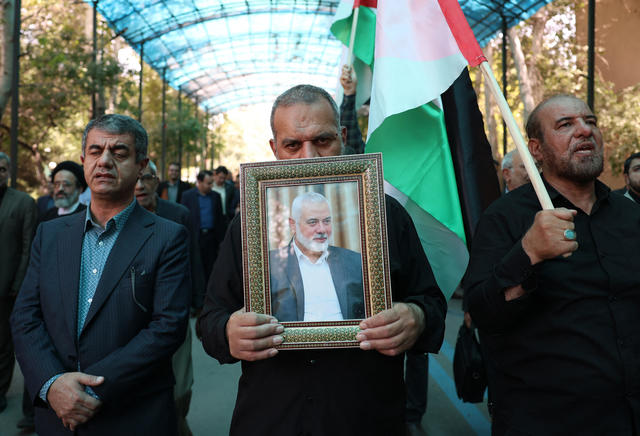CAIRO/DUBAI, (Reuters) – Hamas leader Ismail Haniyeh was assassinated early this morning in Iran, the Palestinian militant group and Tehran said, drawing threats of revenge on Israel in a region already shaken by the war in Gaza and a deepening conflict in Lebanon.
Iran’s Revolutionary Guards confirmed the death of Haniyeh, hours after he attended a swearing in ceremony for the country’s new president, and said it was investigating.
Haniyeh, normally based in Qatar, has been the face of Hamas’s international diplomacy as the war set off by the Hamas-led attack on Israel on Oct. 7 has raged in Gaza. He had been taking part in internationally-brokered indirect talks on reaching a ceasefire in the Palestinian enclave.
Hamas’ armed wing said in a statement Haniyeh’s killing would “take the battle to new dimensions and have major repercussions”. Vowing to retaliate, Iran declared three days of national mourning and said the U.S. bears responsibility because of its support for Israel.
Iran’s Supreme Leader Ali Khamenei said Israel had provided the grounds for “harsh punishment for itself” and it was Tehran’s duty to avenge the Hamas leader’s death as it had occurred in the Iranian capital. Iranian forces had already made strikes directly on Israel earlier in the Gaza war.
There was no comment nor claim of responsibility from Israel. The Israeli military said it was assessing the situation but had not issued any new security guidelines for civilians.
Prime Minister Benjamin Netanyahu was expected to meet for consultations with security officials at 4 p.m. (1300 GMT).
U.S. Secretary of State Antony Blinken, at an event in Singapore, sidestepped a question on Haniyeh’s killing, saying a ceasefire deal in Gaza was key to avoiding wider regional escalation.
“I’m not going to speculate on what impact any one event might have on that, I’ve learned over many years.”
He told Channel News Asia that the U.S. had neither been aware of nor involved in the killing.
The assassination, which took place less than 24 hours after Israel claimed to have killed the Hezbollah commander it said was behind a deadly strike in the Israeli-occupied Golan Heights, appears to set back chances of any imminent ceasefire agreement in the 10-month-old war Gaza.
Israeli Defence Minister Yoav Gallant said Israel was not trying to escalate the war but was prepared for all scenarios. Visiting an air defence battery, he praised the forces who carried out the attack on the Hezbollah commander in Beirut.
Qatar, which has been brokering talks aimed at halting the fighting in Gaza along with Egypt, condemned Haniyeh’s killing as a dangerous escalation of the conflict.
“Political assassinations and continued targeting of civilians in Gaza while talks continue leads us to ask, how can mediation succeed when one party assassinates the negotiator on other side?” Prime Minister Sheikh Mohammed bin Abdulrahman Al Thani wrote on X.
Egypt said it showed a lack of political will on Israel’s part to calm tensions. China, Russia, Turkey and Iraq also condemned it.
Iran’s top security body met to decide strategy in reaction to the death of Haniyeh, a source with knowledge of the situation said.
Palestinian President Mahmoud Abbas condemned the killing and Palestinian factions in the Israeli-occupied West Bank called for a strike and mass demonstrations.
In Israel, the mood was buoyant as Israelis welcomed what they saw as a major achievement in the war against Hamas, though residents in besieged Gaza feared Haniyeh’s death would prolong the fighting that has devastated the enclave.
“What a loss. We lost one of our very own,” said Gaza resident Fatima Al Saati who was sleeping when news of Haniyeh’s death broke. Another neighbour, Hachem Al-Saati, said: “This news is scary. We feel that he was like a father to us.”
PUBLIC FACE OF HAMAS
There is no sign of an end to Israel’s campaign in Gaza as ceasefire talks appear to have faltered.
The risk of a war between Israel and Hezbollah has also grown following the strike in the Golan Heights that killed 12 children in a Druze village on Saturday and the subsequent killing of the senior Hezbollah commander Fuad Shukr.
Hezbollah has not yet confirmed Shukr’s death, but said he was in the building hit by an Israeli strike.
Appointed to the Hamas top job in 2017, Haniyeh has moved between Turkey and Qatar’s capital Doha, escaping the travel curbs of the blockaded Gaza Strip and enabling him to act as a negotiator in ceasefire talks or to talk to Hamas’ ally Iran. Three of his sons were killed in an Israeli airstrike in April.
His deputy Saleh Al-Arouri was killed in January by Israel, leaving Yehya Al-Sinwar, the Hamas chief in the Gaza Strip and the architect of the Oct. 7 attack on Israel, and Zaher Jabarin, the head of the group in the West Bank, in place but in hiding.
The war started on Oct. 7 when Hamas-led fighters carried out a devastating attack on Israeli communities, killing 1,200 people and abducting some 250 hostages into Gaza, by Israeli tallies.
In response, Israel launched a ground and air offensive in the coastal enclave that has killed more than 39,400 people, according to Gaza health officials, and left more than 2 million facing a humanitarian crisis.





